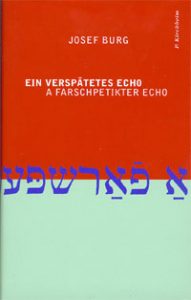Bücher und Menschen
K. und ich sitzen dicht neben dem kleinen altertümlichen Ofen, der auf Hochtouren läuft, aber gerade nur so viel Wärme abgibt, dass man es eben noch so aushalten kann im winterlich kalten Studio des Malers und Dichters D. P. in Chisinau. Uns gegenüber sitzt D., der gerade in einen Katalog eines bulgarischen Malers vertieft ist, den er zu dessen Lebzeiten gekannt hat; zwischen uns ein Tisch auf dem sich Malutensilien, diverse Brillen, Medikamentenschachteln, ein Teller mit Früchten und drei noch halbvolle Gläser mit moldauischem Cognac ein Stelldichein geben. D. strahlt. Der Besuch und das Interesse an seinen Gemälden tun ihm gut und er blüht förmlich auf. Besonders gegenüber der jungen Frau zeigt er sich aufmerksam und charmant und ich wundere mich nicht, dass sehr viele seiner im Studio befindlichen Werke Porträts meist junger Frauen und Mädchen sind. Trotz seiner 74 Jahre flirtet er ein wenig mit K., die es mit gutem Humor aufnimmt. Zur aufgekratzten Stimmung trägt auch bei, dass ich ein Bild gekauft habe, ein stimmungsvolles, schön komponiertes Stillleben mit Früchten und einer Karaffe, welches mir sofort auffiel. D. hat große Probleme mit den Augen und der ausgemachte Kaufpreis hilft, die notwendige Operation zu bezahlen.
– ‚Ich komme aus einer Familie, in der es Bücher gab und in der gelesen wurde‘, sagt D. nachdem er den Katalog zur Seite gelegt hat. – ‚Das war ganz und gar nicht alltäglich in unserem Dorf im Budzhak, dem heute zur Ukraine gehörenden Teil Bessarabiens. Die Liebe zur bulgarischen Sprache habe ich von meiner Mutter, das Verständnis für den Reichtum der Muttersprache und dafür, dass Sprache mehr sein kann als nur ein bloßes Verständigungsmittel; das Wissen, dass man wirklich in der Sprache wohnen und zuhause sein kann habe ich von ihr. Die Liebe zu und der Respekt vor Büchern kommt dagegen vom Vater und Großvater. Zu Anfang des letzten Jahrhunderts hat Großvater angefangen, eine private Bibliothek zusammenzutragen. Darin gab es Bücher in verschiedenen Sprachen, Bulgarisch, Russisch, Rumänisch…viele davon müssen teuer gewesen sein; es waren aufwendig gedruckte und gebundene Bände darunter, viele mit Illustrationen. Er liebte besonders Werke zu religiösen Themen. Auch mein Vater kaufte später Bücher für diese private Bibliothek. Als dann die Rumänen kamen, füllte er eine große hölzerne Truhe mit Büchern in russischer Sprache, die er dann irgendwo vergrub. Wer russische Bücher im Haus hatte, galt den Rumänen als gefährlich, als Verräter, und hatte mit schweren Konsequenzen zu rechnen; mancher verlor sein Leben wegen ein paar russischer Erbauungsbücher im Haus. Später kamen dann die Russen zurück, und wieder wurde eine große hölzerne Truhe gefüllt, diesmal mit Büchern in rumänischer Sprache. Nun wurde nämlich jeder mit rumänischen Büchern im Haus als Verräter angesehen und schwer bestraft, in die Verbannung geschickt oder erschossen. Niemand weiß heute mehr, wo die Truhen vergraben sind; vielleicht hat jemand sein Haus dort gebaut, wo sie liegen, nicht ahnend, was für ein Schatz und was für eine Geschichte dort verborgen ist.‘
Über das Buchenland, die Bukowina, und seine Hauptstadt Czernowitz sagte Paul Celan, dass dort einst Bücher und Menschen lebten; doch dasselbe gilt wohl auch für das benachbarte, am gleichen Meridian gelegene Bessarabien.
© Thomas Hübner and mytwostotinki.com, 2014-8. Unauthorized use and/or duplication of this material without expressed and written permission from this blog’s author and/or owner is strictly prohibited. Excerpts and links may be used, provided that full and clear credit is given to Thomas Hübner and mytwostotinki.com with appropriate and specific direction to the original content.




 Facebook
Facebook RSS
RSS Twitter
Twitter